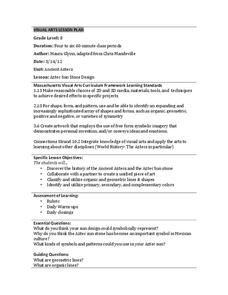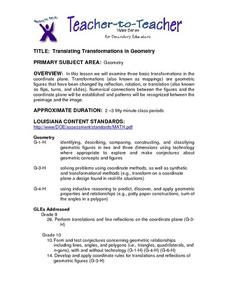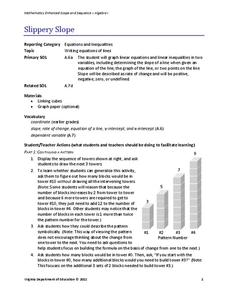Scholastic
Volleyball Road Trip
Review coordinate mapping with your young geographers by matching cities on a volleyball team's road trip itinerary to their appropriate coordinate locations.
Annenberg Foundation
America's History in the Making: Classroom Applications Three
How can primary sources bring history to life? Scholars create detailed lesson plans on the late nineteenth and early twentieth centuries in American history. The 17th installment of a 22-part program exploring American history examines...
Curated OER
Tracing Three Shapes
In this tracing worksheet, students trace a heart, star, and pentagon four times each. The shapes are on standard primary lines.
Curated OER
Ancient Aztecs
Is it a calendar? A religious symbol? A political statement? One thing for certain is that Aztec sun stone designs remain an important symbol in Mexican cultural art. Young artists craft their own Aztec Sun design incorporating ideas...
Cornell University
Buoyancy
Swimmers know to float by turning their bodies horizontally rather than vertically, but why does that make a difference? In an interesting lesson, scholars explore buoyancy and the properties of air and water. They test cups to see which...
National Woman's History Museum
Propaganda and Women's Suffrage
Americans who backed the suffragist movement used posters to gain the support of others for their cause. Class members analyze the visual imagery and propaganda devices used in a variety of these posters. In addition, groups examine how...
Newseum
From the Front Page to the History Books
Young journalists compare news coverage of four major events with how the same events are covered in historical accounts. The ensuing discussion asks class members to compare and contrast the role of a reporter and the role of a historian.
Museum of Tolerance
Music Evokes Memories and Emotions
Dim the lights, take a deep breath, and press play to explore the emotions and memories that music elicits. Class members begin using relaxation techniques designed to create a positive listening experience. As music plays, learners...
National Endowment for the Humanities
The Metamorphoses and Later Works of Art: A Comparison of Mythic Imagery
In a lesson on The Metamorphoses, scholars compare how graphic artists use mythic imagery to represent Ovid's tales. Each group selects a work of art paired with Ovid's version of a myth and compares how both present the story.
Virginia Department of Education
Transformations
Geometry in life-sized dimensions! Using enlarged graph paper, pupils perform a series of transformations. By recording the initial and final placement of the images, they are able to analyze the patterns in the coordinates during a...
Virginia Department of Education
Inequalities
Compare graphing an inequality in one variable on a number line to graphing an inequality in two variables on a coordinate plane. Young mathematicians work on a puzzle matching inequalities and their solutions. They then complete a...
Australian Government
The Great Artesian Basin
Covering 23% of the continent and holding 64,900 cubic kilometers of water, the Great Artesian Basin is the primary source of water for much of inland Australia. Using detailed student worksheets, experiments, and case studies, young...
It's About Time
Succession in Communities
What occurs following a natural disaster? High schoolers research this question and others as they investigate natural succession after a disaster. First, as they differentiate between primary and secondary succession, they explain how...
National Woman's History Museum
Women, Propaganda, and War
Governments rely on propaganda to build support for wars. Class members examine six propaganda posters, two each from the Spanish-American War, World War I, and World War II, and analyze how the way women were portrayed in the posters...
Curated OER
Translating Transformations in Geometry
High schoolers create an image using given coordinates and evaluate how the coordinates change when a slide or rotation takes place.
Curated OER
Tracing Curved Lines
In this tracing worksheet, students trace 18 curved lines that are shown on standard dotted primary lines. There are no directions.
Curated OER
Tracing Jagged Lines
For this tracing worksheet, students trace three rows of jagged lines on regular primary writing lines. Students follow the dotted examples as carefully as possible.
Curated OER
Primary Bouncing
Students develop hand and ey coordination. The focus is upon handling a ball. This could be helpful for practice for sports like basketball or volleyball. This helps with repetition to develop muscle memory and visual or spatial ability.
Virginia Department of Education
Slippery Slope
Explore slope using geometric patterns. Young mathematicians investigate towers built from cubes to develop a linear pattern. They move the data to a coordinate plane to connect the pattern to slopes.
Curated OER
I Do Solemnly Swear: Presidential Inaugurations
Students examine the process of presidential inauguration. They examine and discuss primary source documents and complete worksheets.
San Bernardino Co. Supt. of Schools
Was Julius Caesar a Good Leader for Rome?
Learners consider the various perspectives that different groups in Roman society may have had for Julius Caesar, such as Roman soldiers, senators, the working class, and slaves. The primary activity involves a reading of Caesar's...
Curated OER
Connecticut Complicity
Eleventh graders take a closer look at slavery in Connecticut. In this slavery lesson, 11th graders research the contributions of Connecticut residents who spoke out about the issue of slavery. Students take on the personas of the...
Urbana School District
Light
You matter, unless you multiply yourself by the speed of light ... then you energy. Presentation covers the behavior of light as both a wave and a particle, light versus sound, space travel, why objects have colors, depth perception,...
Smithsonian Institution
Two Perspectives on the Battle of Little Bighorn/Greasy Grass
Learners understand why historians conduct research and the importance of perception when it comes to studying history. The resource covers The Wars of Expansion and the Battle of Little Bighorn/Greasy Grass through group work, debate,...

























